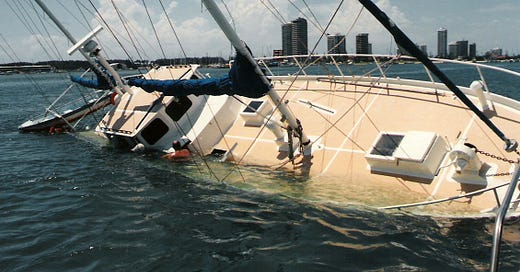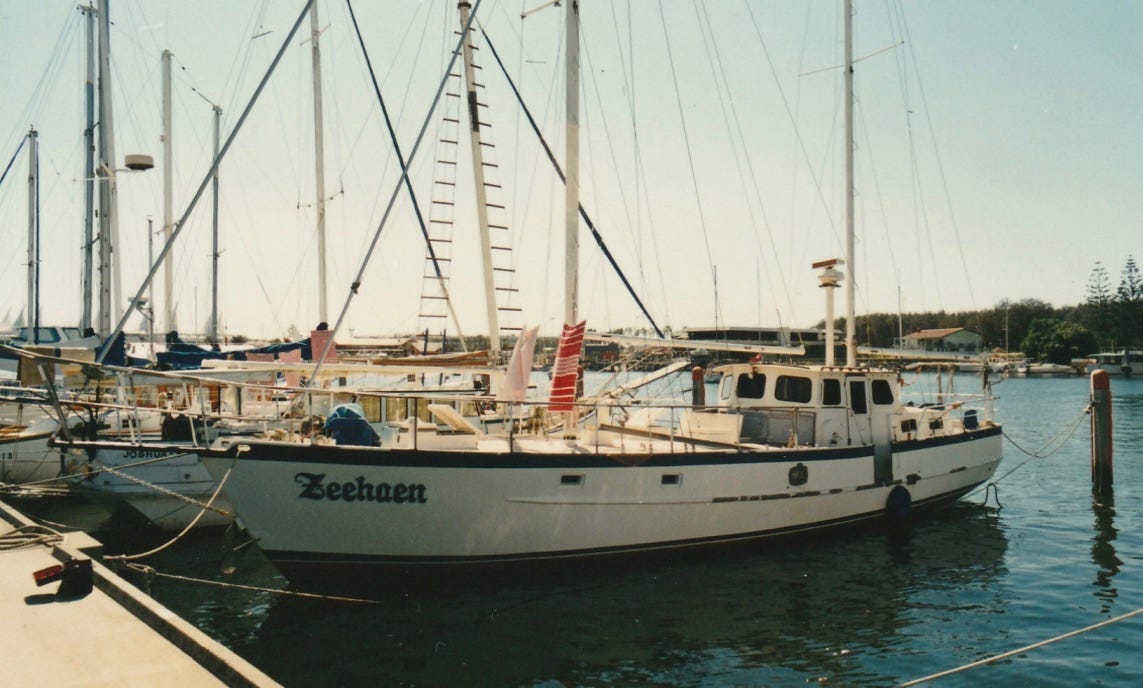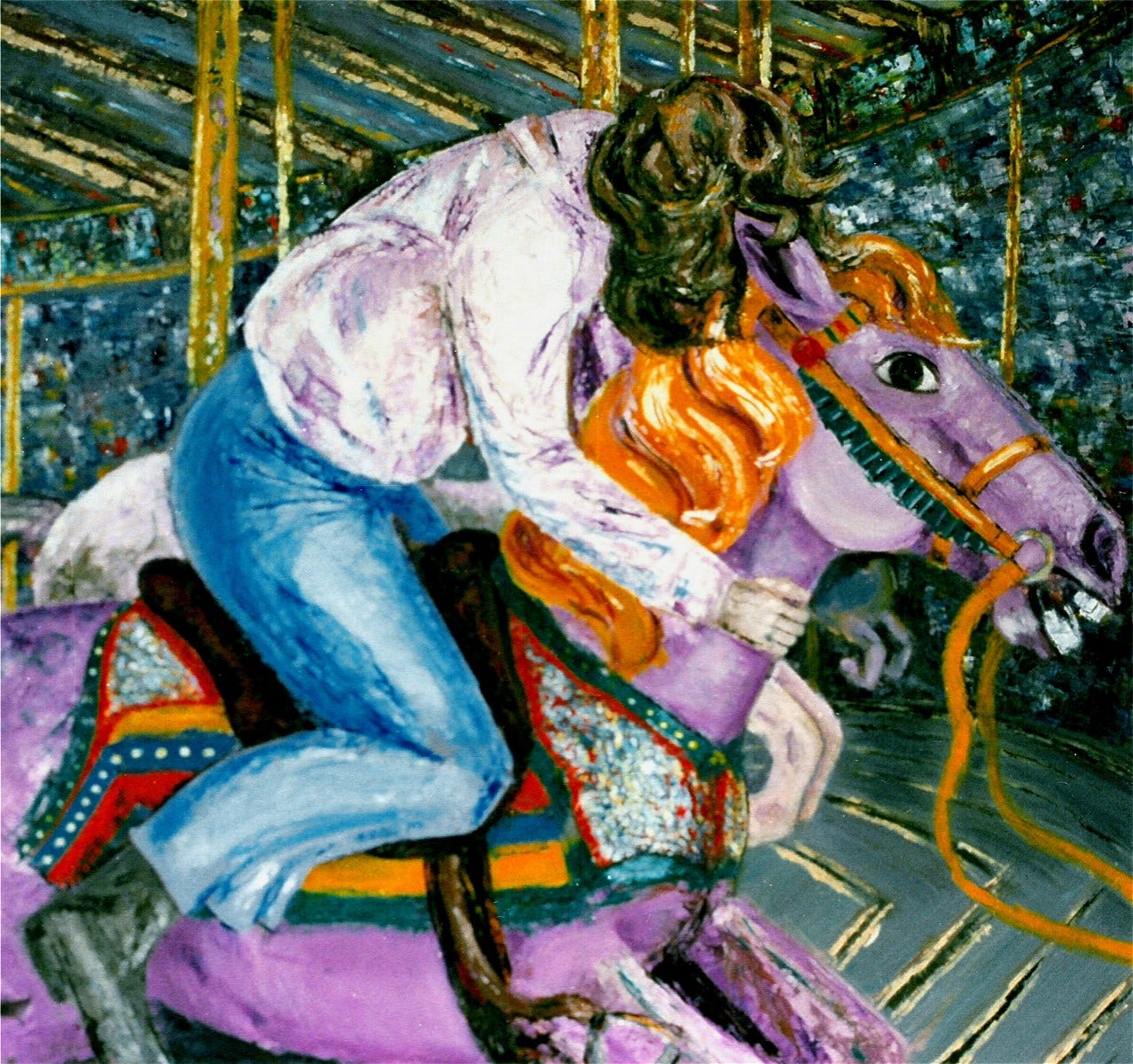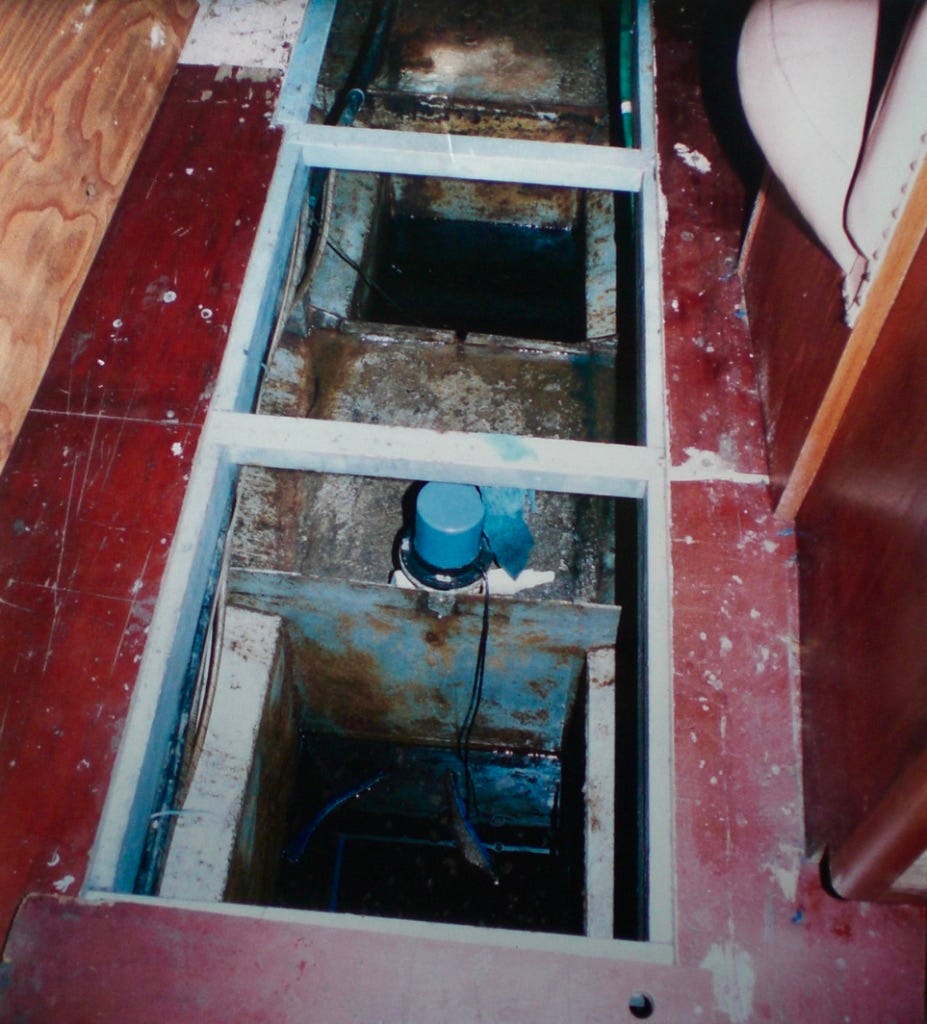How a Foundered Yacht Forced Me to Face Dark Family and Political Secrets
And discover how we the people can change the political on a personal level.
At the beginning of February this year, I returned to my home country of Australia after living in New Zealand for twenty-seven years. The story I want to share with you today is about a thirty-eight-year journey that changed my life in such extraordinary ways that it enabled me to face the ugly truth about what is happening in our world.
It was in Queensland, Australia, where this story began on 8 February 1986, the day Zeehaen foundered on a sandbar after my marriage broke up. My husband and I purchased the fifty-foot steel ketch with the intention of sailing the world. Instead, her stricken plight became an out picturing of how I felt inside. Blown broadside onto a sandbar while at anchor during a storm, Zeehaen toppled over into deep water when the tide went out. With an open seacock above the waterline suddenly submerged, gushing water flooded the yacht as the tide rose, and Zeehaen was unable to right herself.
It later prompted me to ask: “What is the open seacock that caused me to sink?”
Rescuing the yacht from the clutches of greedy salvagers, I began stripping out everything inside – leather upholstery, carpets, white ware, mattresses, teak veneer linings, noggings, insulation...and the list went on. What was beyond use or repair I tossed overboard onto the tray of a ute to take to the tip. It was then that a quiet voice whispered, “This is what you need to do inside you.” Startled by this I began to wonder what was within me that needed to go to the tip.
It was a major turning point. What appeared on the surface to be a disaster became a gift that kept on giving. I had work to do, not only on the yacht, but also within myself. It demanded my full attention.
Once Zeehaen was back in the water and the interior refit was well underway, I moved to live aboard to work on the yacht myself, and hired a builder to help me. After settling the yacht into a marina berth at Southport (on the Gold Coast in Queensland), I found myself in a totally foreign world where millionaires rubbed shoulders with ordinary folk, fishing charter skippers, and cruising yachts people from around the world.
One of the stand out colorful characters living on a neighboring marina was a drug smuggler and pirate, Barney, who had made a video of real life drug smugging with the title, Nothing to Declare. A man who had skippered Zeehaen for a previous owner introduced him to me aboard his fishing charter vessel just as Barney appreared with two plain clothed police detectives, ranting about why they had bugged the boat. He had perfected the “penguin walk” he loved to boast, and to uproarious laughter demonstrated what he meant by shuffling along, arms at his sides and hands turned back behind him in anticipation of a kickback. He knew people in high places in foreign countries, he said, and was flown first class to help make important deals.
On a marina arm behind me was Cosmos, Christopher Skase’s $6 million motor yacht. Skase1 was in his late thirties at the time, and building one of his Mirage Resorts at Main Beach, a stone’s throw away. At odd times during the night I heard the bow thruster easing the yacht in and out of the berth, and couldn’t help but wonder at the extravagance of it all just for one man and his family. Shown over it one day by a caretaker, I was in awe of the vast and opulent main saloon with its dozen or more chandeliers that seemed too fragile to endure a wild storm at sea. But what caught my special attention was a plaque describing what ‘Cosmos’ symbolized: “finding order and harmony out of chaos.”
It was a journey I had unconsciously begun.
The tales I was told on the Gold Coast waterfront were unbelievable, but true. A police detective, Peter, working in South East Asia for the Australian Security Intelligence Organisation (ASIO), had tried in vain to catch Barney smuggling drugs there. The irony was that he was now living on his boat at the same marina as Barney and backed up his many improbable tales that stretched my imagination almost to breaking point. He was a “lovable rogue” according to Peter. Perhaps it was Barney’s ‘tall tale’ of skippering the police training ship to catch drug smugglers for the New South Wales drug squad that shocked me the most, along with his almost insane laugh when he said, “And they were it. They were the drug smugglers.”
Until then I had led a sheltered life as a school teacher and farmer’s wife...
At that time (1987-1988) corruption was rife in the Queensland government and police force. Peter told me that some of the police officers offered to let women off traffic fines in exchange for sex after pulling them off the road. Disgust showed in his eyes, silencing my tongue, while shadows of barely contained anger crossed his face.
I had been sitting on the after deck in the early morning sun reading a book when Peter walked along the jetty and stopped as he drew level with Zeehaen. He flipped his suit jacket over the gun holstered at his side and said, “I am looking for someone named Juliet.” I rarely saw Peter on this marina and laughed somewhat nervously, asking if he would like a coffee. It was an odd sight, I recall, seeing a man in a suit climbing over Zeehaen’s bowsprit. In the morning.
In the galley I set the kettle to boil. Peter slumped down on the settee. Got up and began pacing like a lion behind bars. With the kettle making its rumbling noise, he paced up to me and, in an interrogating stance with his hands on his hips he said, "It seems an absolute waste that a woman like you hasn't got a man – that there's no one out there for you." He shook his head and continued pacing before spinning on his heels and eyeballing me. "Men are animals.” His voice was hard and raspy. Lowering it he said, “Don't trust any of them – not even me.” Startled, I looked into the torment in his eyes as he told me he had been working all night on multiple rape and assault on women cases. In the grim and disturbing atmosphere he created, something within me jolted wide awake.
By that time I had begun writing a book I had wanted to write since my early twenties about the impact of my parents’ divorce on my life. A deep grief had been eating away at me for years and I could not trace its source. I gained the impression that something buried underneath the grief of the divorce, and the subsequent loss of my mother from my life, had magnified it somehow. However, with the manuscript complete at the beginning of 1989, I was still unable to discover what it was, and with Zeehaen gone to new owners, I travelled to the United States looking for a publisher.
An editor from Doubleday in New York picked up my sample chapters from a slush pile and, after they found their way to the publisher’s desk, I received an encouraging letter with a recommendation to “tighten up the narrative.” As I was about to begin the first rewrite at a deserted summer camp in New Hampshire at the beginning of 1992, another Doubleday editor gave me a jolt when he said, “I don't believe you’ve told the whole story.” I was dumbfounded. But there in the middle of winter with snow falling outside and Lake Winnipesaukee completely frozen over and dotted with bob houses and little islands, memories began to return of what happened in my childhood.
Alone in the ice and snow watching the squirrels’ antics along snow-covered branches, there were times I felt I was losing my mind. A story totally foreign to me began to emerge as if I was witnessing the life of a stranger. Even my experience at the marina in Southport could not have prepared me for what I was about to uncover over the next thirty years.2
I had set sail, figuratively speaking, into the unknown, and for years it felt like I was wallowing in a heavy swell with a broken rudder and torn sails. A memory would return like a sudden squall out of nowhere that sent me spinning around and around. Gathering all my strength I tried to get some steerage playing the sheets on the torn sails, and I limped along like this for what seemed like an eternity, guided by some invisible force. However little did I know that the winds blew in my favor, for each time a storm or squall hit, I was carried closer and closer to land...and the truth that had been playing hide and seek with me for years.
During this time I uncovered family secrets that no child should ever have had to bear alone. The gift of this was that in my heart I had an irrepressible desire to uncover the truth in all things. I discovered that once I could face the truth of what happened in my own family and find compassion in my heart, I could also face the truth of what I discovered when I went digging into the secrets our governments have an investment in keeping hidden – secrets behind the chaos in the world that is leading us precariously close to another world war.
Eventually I learned that the real battle to be fought is not ‘out there’ against our governments or enemies; it is within each and every one of us. It is where our true power resides to change things for the better. What I had to cast out of myself and take to the tip were the lies I believed, and the false beliefs I created about myself from my earliest childhood experiences. Along the way I learned to stop blaming my parents, victims also of what happened in their childhoods during the Great Depression and, in my father’s case, including his traumatizing experience of war against the Japanese in New Guinea.
Just as I had rebuilt Zeehaen on the inside with love, so too was I learning to rebuild myself from the inside out with love, positive new thoughts and beliefs, and the strength and wisdom gained from every difficult obstacle I overcame. This is a process of self-empowerment. And self-empowered people are the ones who can make positive changes in the world. If enough people are self-empowered, it is my belief that our current compromised and corrupt governments would cease to exist.
By finding our voice through self-empowerment, it becomes increasingly difficult for governments to wage aggressive wars on other countries, or commit atrocious acts like murdering a president in broad daylight in the street, trafficking children for sex, brazenly bringing drugs into the country while waging a war against them, or launching bioweapon attacks against its own people. Empowered people make sure the government is accountable for its actions, and that it does not lock up whistle-blowers like Julian Assange and Chelsea Manning, or allow journalists who expose the truth about war to be tortured to death like Gonzalo Lira in a Ukrainian prison. And so on.
I am a seeker of the truth about what is happening in the world behind the scenes precisely because I learned to face the ugly truth in my family, and dug up the secrets that were sabotaging happiness and prosperity in my life. When we are ignorant of our own repressed memories and experiences, or don't want to see what may be hidden within us, we project this unwanted stuff out into the world, onto others, politicians, a country as an unconscious way of making it visible. Then we attack it instead of consciously dealing with it within ourselves. American writer and poet, Robert Bly, points out:
People who are passive towards their projected material contribute to the danger of nuclear war, because every bit of energy that we don’t actively engage with language or art is floating somewhere in the air above the United States, and Reagan can use it [or Biden, or Harris, or Trump]. He has a big energy sweeper that pulls it in. No one should make you feel guilty for not keeping a journal, or creating art, but such activity helps the whole world… One of the things we need to do as Americans is to work hard individually at eating our shadows, and to make sure we are not releasing energy which can then be picked up by the politicians, who can use it against Russia, China, or the South American countries. 3
If we are at war within ourselves, if we are filled with self-hate and anger, this is precisely the energy that will sweep up young people into the armed forces to vent their unresolved anger and give it righteous and legitimate expression.
Since returning to live in Australia this year, I have taken time out to reassess everything I am doing after the ongoing stress of the Covid nightmare in New Zealand that pushed me down deeper into rabbit holes I had so tentatively entered years before. After witnessing the insanity of world events continuing to unfold this year, I know I have no choice but to continue this research and writing. I understand much of the history, the social problems, and the problems within our homes and educational institutions. I know what will happen to us if we do not wake up in time from our collective trance, as if we are deer caught in headlights, unable to take action.
I awoke this morning remembering the day I took Zeehaen out of her berth to offload my things at a wharf after selling her, and how one of my volunteer crew members started yelling orders and otherwise going a little crazy – maybe because he didn't trust a woman at the helm. Thankfully I was able to completely ignore him and stay focused on the tricky manoeuvre I was doing, which turned out okay and exposed his yelling as wasted hot air.
Thinking about this, it aroused my curiosity as to why I can remain so calm when people around me have panicked. Back in 1988 I looked upon myself as a stoic who was able to keep on going in the face of whatever difficult situation I found myself in. The dictionary on my Mac computer describes a ‘stoic’ as: A person who can endure pain or hardship without showing their feelings or complaining. After all these years of throwing off the damaged stuff within me to take to the tip, it is now clear how this stoicism developed.
Violence, yelling, drama, or acting in crazy ways was ‘normal’ in the home where I grew up. Even as a small child I knew this behaviour was crazy and learned not to react to it, for any sort of reaction only caused more unpleasant stuff to rain down upon my head. So I became an observer, or simply dissociated, which is how I became a stoic.
However while stoicism can get a person through a painful and difficult situation, afterwards there is a price to pay, for suppressed feelings demand to be heard. Listening to them is painful work. Not doing this work can lead to depression, personality disorders, mental illness, numerous and ongoing health problems, and addictions of every kind.
A few years before the yacht sank I painted myself on a merry-go-round spinning out of control. It depicted a sense of depression and entrapment, hopelessness and despair, yet I was afraid to jump off. It was not only an unhappy marriage I was trapped in, but repeated cycles of abuse begun in early childhood, of which I had no memory. It finally became clear to me that these repeating cycles were trying to get me to see what I needed to heal, and offload at the tip.
Judith Herman, a leading authority in trauma recovery, wrote:
To speak publicly about one’s knowledge of atrocities is to invite the stigma that attaches to victims.
The knowledge of horrible events periodically intrudes into public awareness but is rarely retained for long. Denial, repression, and dissociation operate on a social as well as an individual level… Like traumatized people we have been cut off from the knowledge of our past. Like traumatized people, we need to understand the past in order to reclaim the present and the future. Therefore, an understanding of psychological trauma begins with rediscovering history.4
While rediscovering history and speaking about it is a painful process, not to do this work means that yet another generation will suffer from family secrets hidden under the rug or locked in closets within their homes. Rediscovering history provides a vital opportunity to heal the past and ensure that the ‘buck of violence, abuse, and neglect’ stops with each of us.
After years of teaching children in schools and counseling adults with a history of childhood abuse, it is apparent to me that too many children experience their home as a ‘war zone’ where violence, abuse, and brutalization is a ‘normal’ part of life. Children are dependent on adults for the necessities of life and therefore can be trapped for years (like prisoners of war) in unremitting cycles of chaos and abuse living with angry, violent, drug addicted, alcohol dependent, mentally ill, or depressed parents who are often full of self-hate and unwittingly acting out, or reacting to, their own abusive childhoods.
Some children escape this ‘prison’ through suicide, by running away and becoming homeless, or mentally disappearing into fantasies or intellectual pursuits. Others numb their painful feelings with alcohol, drugs, food or a host of negative coping strategies like cutting themselves, high-risk behavior, and promiscuity. While some dissociate or develop amnesia to erase all memories of what happens inside their childhood ‘prisons’, others escape the humiliation of being a victim by becoming perpetrators of the violence they tried in vain to escape.
Perhaps all the crazy stuff going on in the world today has caused people to dissociate en masse. How many others have also learned to turn off their reactions to the insanity that was ‘normal’ in their homes while they were growing up? How many women and children learned to do this while trapped in domestic violence created by men returning from war suffering with post-traumatic stress disorder (PTSD)? How many people learned to do this during the Great Depression, ongoing recessions, or credit squeezes where they lost everything they had worked hard for, including their jobs? And now...?
As a child I was taught to “grin and bear it.” I, for one, am no longer willing to do that. And so I will write! I will continue my research to uncover the history that has led us collectively to the mess and chaos we are currently experiencing.
Back in Australia the same problems confront me that I left behind: the violence Peter had forced me to see that morning he accepted my invitation for coffee aboard Zeehaen. In less than four months from the beginning of this year, 26 women have been killed (one every four days), allegedly at the hands of a man. A tipping point was reached with women marching in the streets to protest and say, “No More!”
Before I left to live in New Zealand in 1996, an Italian woman told me that one of the most effective ways to destroy a culture or society was to rape the women. Although I found this hard to believe at the time, I now know just how true it is. Yet I will also add that an even more insidious and effective way to destroy a culture is to rape the children. I will write about why in another article.
When Zeehaen was lifted out of the water for repairs after she sank, a man remarked after watching me strip off the barnacles that resisted high-pressure hosing, “You know, steel boats more often than not rust from the inside out. The outside of the hull can look in perfect condition, but inside it can reveal a very different story.”
His words returned to haunt me later after I stripped the yacht back to bare steel and pumped salt water out of the bilges and found, to my dismay, deep pockets of rust along stringers and elsewhere. While I chipped, scraped and wire-brushed the rust, I began to understand the work I had to do on myself. Left untreated, rust becomes a cancer-like growth that destroys the integrity of the steel and diminishes its strength to the point that one day it could cause the yacht to sink. The same applied to me...applies to us. And society.
What is the rust or the open seacock that could sink you? What do you need to offload at the tip?
We can no longer afford stoicism in the face of our collective plight, or ‘to grin and bear it’, or ‘suck it up’. A tipping point has been reached. It is time to take action.
Related
World-leading physician, Gabor Mate, talks about the invisible effects of childhood trauma, including how childhood trauma impacted Donald Trump.
Notes and References
At that time Skase was paying himself and his fellow executives millions in management fees. A few years later, after attempting to further inflate his empire bubble, it burst in a very dramatic way, bringing down the State Bank of Victoria and causing huge grief and loss to many people. He filed for bankruptcy, stating that all he had left was $170.00 in cash and a few clothes and books. He fled to Spain, where he lived out the remaining ten years of his life in Majorca, safe from extradition orders to face his creditors in Australia.
My original book manuscript morphed into years of research about the ripple effect of child abuse that often left me deeply shocked, and at times, despairing. The work on it continues, for it became the best therapy I could find to heal my life.
Robert Bly, edited by William Booth, A Little Book on the Human Shadow (1988), HarperSanFrancisco, p. 43
Judith L. Herman M.D., Trauma and Recovery: The aftermath of violence – from domestic abuse to political terror, (1997), p. 2
If you would like Rude Awakenings delivered to your inbox you might like to…









You're back!!! I have missed your writing and insights. Currently I am reading Elizabeth Nickson 's substack. Very much like you. You two are amazing, thoughtful writers. ❤️
I too had childhood trauma. I understand.
Captivating! ... and I was only going to only eye this over first. Got lot to think from this. Shadows truly need work - on so many levels! Thank you!